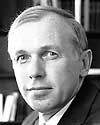Arthur Burks
Computer science and philosophy professor Arthur Burks, whose late-1940s work on the logic of computer programming helped to lay the foundation for the digital age, died May 14 in Ann Arbor. He was 92.

Burks, an active faculty member for 40 years, also was one of the principal engineers of the first general purpose electronic digital computer, the Electronic Numerical Integrator and Computer (ENIAC). He was instrumental in bringing several components of ENIAC to the University. They are on display in the Computer Science and Engineering Building.
The philosopher and mathematician was a co-author of the 1946 paper “Preliminary discussion of the logical design of an electronic computing instrument,” which took leaps in logic that helped to advance computing from the realm of the calculator to that of the modern computer.
The paper proposed that a series of written instructions could direct a machine to perform conditional actions. Earlier computers, like the ENIAC, used wires plugged into control panels called plugboards. Plugboard computers could not decide, in a sense, what to do next based on the outcome of an earlier calculation, says John Holland, a computer science and psychology professor who studied under Burks.
“That paper is widely recognized as the first paper that really discussed programming,” Holland says. “With his co-authors John von Neumann and Herman Goldstine, he really set up the digital age.”
Burks was born Oct. 13, 1915, in Duluth, Minn. He received a bachelor’s degree in mathematics from DePauw University in 1936 and a doctorate in philosophy from U-M in 1941. Burks joined the Department of Philosophy in 1946 and in 1949 founded the Logic of Computers Group, the first research organization dedicated to computing at U-M.
“Though he is perhaps best known for his contributions to the development of computing, Art Burks should also be recognized for his seminal and wide-ranging contributions to philosophy,” says James Joyce, chair of the Department of Philosophy. “Burks did pioneering work in the philosophy of science, making significant contributions to our understanding of causality, the character of laws of nature, inductive logic and of the role of probability in rational decision making.”
Burks helped start the graduate program in communication sciences in 1957 and the Department of Computer and Communication Sciences (CCS) in 1967. He served as the first chair of CCS in 1967-68. In 1984 he joined the Department of Electrical Engineering and Computer Science.
“Professor Burks was a pioneer and an outstanding contributor to the reputation of the University of Michigan in the computing field,” says Farnam Jahanian, professor and interim chair of the Department of Computer Science and Engineering.
He collaborated extensively with the influential Hungarian mathematician John von Neumann. After von Neumann died, Burks finished his groundbreaking final work on complexity and “cellular automata” that concluded it is possible to build a machine that can reproduce itself. Previously it was thought that only living things could reproduce.
“You didn’t have to talk to him long to know that he was brilliant,” says Holland, who called Burks a mentor.
Though Burks was one of the main designers of the ENIAC, he spent much of his life trying to broaden the credit to include physicists before him. By chronicling major lawsuits over ENIAC patents, he and his wife, Alice Burks, publicized the work of John Atanasoff and Clifford Berry, who developed an electronic computer in 1942.
“He was a scholar of the highest integrity,” said Toby Teorey, professor emeritus in the Department of Electrical Engineering and Computer Science.
Burks is survived by his wife of 65 years, Alice, and three children. A memorial service is planned for 5 p.m. June 20 in the Computer Science and Engineering building.
A memorial service is planned for 5 p.m. June 20 in the Computer Science and Engineering building.
John Patrick ‘Pat’ Crecine
John Patrick ‘Pat’ Crecine, the first director of the Institute of Public Policy Studies (IPPS), a pre-cursor to the Gerald R. Ford School of Public Policy and one of the first programs of its type in the nation, died on April 28.

Crecine lost a four-year battle with cancer at his home in Oakland, Pa., at the age of 68. Crecine was born in Detroit and grew up in Lansing. After earning his bachelor’s degree in industrial management and his master’s degree and doctorate in industrial administration from Carnegie Mellon University, he returned to U-M.
At the University Crecine was one of a small group of innovators who laid the foundation for a new approach to graduate training for public service. He was 29 and a newly tenured associate professor when he convinced the University’s leadership to pioneer this new approach by establishing the Institute of Public Policy Studies and awarding a new degree, the Master of Public Policy (MPP). IPPS quickly was joined by similar programs at Carnegie Mellon, Harvard, Berkeley, Texas and Duke and, eventually, hundreds more around the country. These programs placed interdisciplinary social science at the heart of their graduate programs, emphasizing economic and statistical analysis, an understanding the political environment of policy, and the importance of organizations to the successful implementation of public policy.
The joint appointments of the original IPPS faculty (in economics, political science, sociology, industrial engineering, and urban and regional planning) established a structure that endures in the current faculty of Ford School.
Another of Crecine’s innovations at IPPS was a joint degree program with the Law School. The Ford School now has more than a dozen joint degree programs with other professional schools at the University, programs that enroll about a quarter of its master’s degree students.
John R. Chamberlin, professor of public policy and political science and founding director of the Center for Ethics in Public Life, says that “my own life and the lives of many others on campus, both faculty and students, have been importantly shaped by Pat’s pioneering role in establishing the academic field of public policy.”
“Crecine had a compelling vision of how social science could improve the quality of policy analysis and policy making, and he was overwhelmingly persuasive and energetic in articulating that vision,” says Paul Courant, University librarian, dean of libraries and the Harold T. Shapiro Collegiate Professor of Public Policy. “He assembled a remarkable interdisciplinary group that I was privileged to join at the very beginning of my academic career. Thanks in large part to Pat, we had fun, we learned a lot from each other and from our students, and we were able to build a program that is one of the best of its kind in the world.”
While at U-M Crecine often was invited to work as an economist with the RAND Corporation. He also left his teaching duties to occasionally serve the federal government as an economist, statistician and consultant.
Crecine is survived by his son, Robert Patrick Jess Crecine; daughter, Kathryn Alicia Barbara Schoenke; brother, Michael James Crecine; grandchild, Cooper; Kellner Schoenke and Barbara Vogel.
— Submitted by Laura Lee,Gerald R. Ford School of Public Policy

